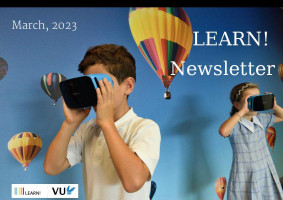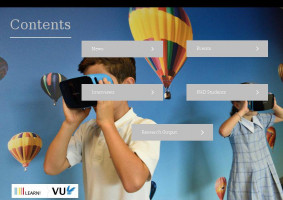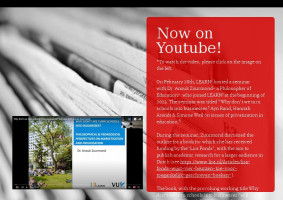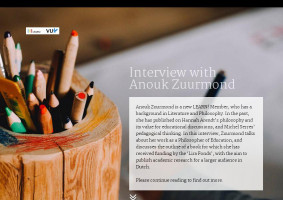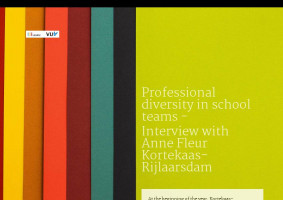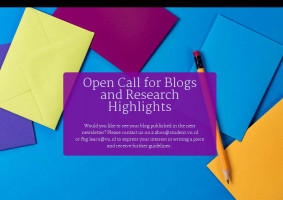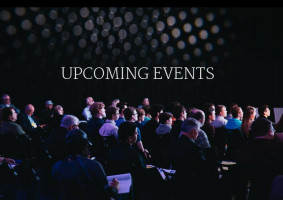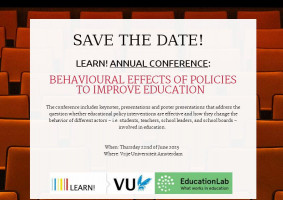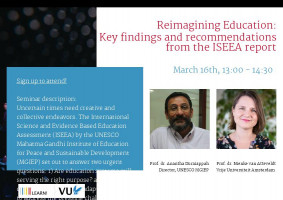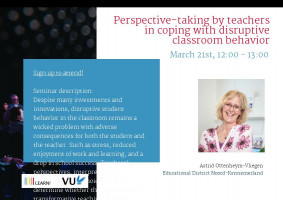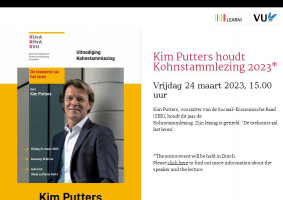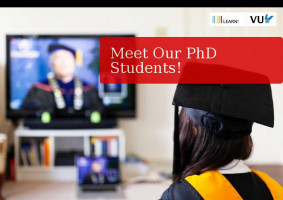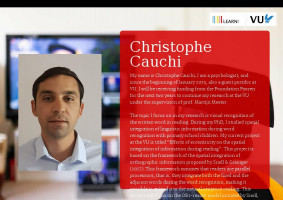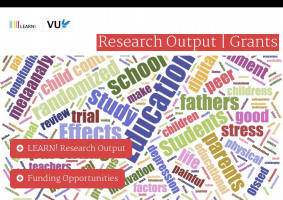Anouk Zuurmond is a new LEARN! Member, who has a background in Literature and Philosophy. In the past, she has published on Hannah Arendt’s philosophy and its value for educational discussions, and Michel Serres’ pedagogical thinking. In this interview, Zuurmond talks about her work as a Philosopher of Education, and discusses the outline of a book for which she has received funding by the ‘Lira Fonds’, with the aim to publish academic research for a larger audience in Dutch.
Please continue reading to find out more.
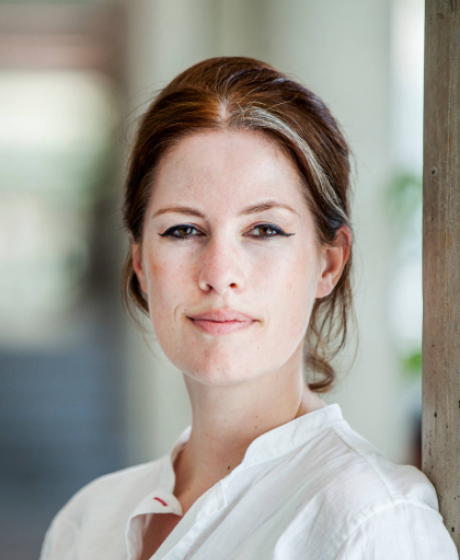
Could you describe your professional background and say how that led you to become specialised in philosophy of education?
My background is in humanities, particularly in philosophy and literature. I used to work as a teacher in philosophy; later on I became part of a teacher training institute. It was during my work as a teacher trainer when I realised that I really missed something in the curricula of the teacher training institutes. Eventually, I discovered it was my own personal background that I felt was missing, namely the philosophical aspects of working in education. The curricula were focused solely on classroom management and didactics, completely omitting the more fundamental questions.
‘What is the role of education? What is the role of school in society? What do we aim for when we educate our children?- These kinds of topics are hardly addressed in the teacher training curricula’
Because of that, I became interested in the overlap between philosophy and teacher training and started working on a course myself. I successfully developed and implemented a course on Philosophy of Education at the teacher training institute. Next, I started working at the University of Groningen as a coordinator of a track called Ethics of Education. This is a track where philosophy and theory in general, like history and law, come together to look at educational dilemmas from a multidisciplinary perspective. I really appreciated the fact that these educational dilemmas were complex socio-political and moral dilemmas which we were able to work on with students. As a result, I really grew into liking the topic of philosophy of education, specifically the moral dilemmas concerning education and upbringing. All things considered, you could summarise my background as combining philosophy and teacher training to later finding my way into philosophy of education.
Since then, has the philosophy of education became more prominent in the teacher training curricula?
It is part of the curriculum, but it is not compulsory. Nonetheless, I am really happy that it is still part of the program. I consider it a blank space in teacher training curricula that these fundamental societal issues on how we view education are hardly ever addressed. It almost seems like we lack the appropriate language to talk about these issues.
Ironically, when the coronavirus pandemic began, all of the sudden everybody started having philosophical conversations about education. That made me realise that there is a huge interest in the topic, and a huge urgency for philosophy of education. During the pandemic, the discussions concerned topics like the goals of education, as well as those relating to privacy. For instance, we suddenly had to address all sorts of moral dilemmas of teachers who were able to see inside the rooms of students. Furthermore, there were issues with monitoring of students during exams, which had a problematic bias in the system towards implicit racism. That is to say, during the pandemics, all sorts of moral dilemmas came up. They were really pervasive and discussed all over the media, and I realised that you need to have a certain language to know exactly what is being talked about. By that I mean talking about quality, justice and morality, and being aware that this is a philosophical discourse which needs to be addressed. Unless we equip teachers with this specific type of reasoning used in such a discourse, we will run into serious problems.
HAS ANYTHING CHANGED SINCE THE PANDEMICS? HAS THAT BECOME SYSTEMATISED IN ANY WAY?
Not specifically I think, but I do believe that the urgency of expanding our language about education has been observed lately in the last few years. Especially when it comes to all the dilemmas during the covid crisis, I do think there was a change in the public discourse on how to deal with these issues.
But it doesn't really translate into practice, such as courses, changes in curricula and let alone the learning goals that are being rephrased for teacher training.
On the other hand, I witnessed that students find it easier now to understand what philosophy of education is. This in turn makes it easier for me to talk to them about philosophy of education, as it is no longer an abstract way of theorising about the goals of education, but rather it is prominent that it has to do with specific problems that students deal with on a daily basis. What is more, you can deal with them from a very technical point of view. On the contrary, the issue of what we do with data, privacy and racism has not been addressed properly ever since.
How would you then define philosophy of education?
I think philosophy of education is a very broad field, even though it seems narrow if you look at the number of academics working in that field in the Netherlands. If I were to describe it, I think it can be best explained by saying that philosophy of education addresses all sorts of issues and subdivisions that are present in philosophy in general. To give an example, when it comes to political philosophy, you can tie it up to education and ask what is the righteous system, or what is equality in education or equality of opportunity of education, which are all political issues.
If you tie it up to morality, you can investigate how to deal as a teacher with certain moral issues that appear in class, but also how to deal with online proctoring, which is also a moral issue.
When it comes to philosophy of technology, it can be translated into education as well, by asking about the issues of why we allow Google in our classrooms, or why we never address the ways in which data is collected in all sorts of learning systems that are easily adopted in class.
Thinking along the lines of epistemology, one could ask what we agree on as knowledge, why we want to translate this specific knowledge or how to deal with relativity, and so on.
‘I believe that by looking at the subdivisions of the large domain of philosophy, you can tie it up to all sorts of educational issues, which will allow you to get a grasp of what philosophy of education is in essence.’
What else do you focus on in your research?
For the last four years, I was involved in a research project where we studied critical thinking in vocational education, i.e. the MBO in the Netherlands. The great thing about the project was that there were philosophers of education involved, but also educational scientists, teachers and teacher trainers. So we had a real multidisciplinary approach. In the project, we looked at the role of critical thinking in citizenship education. We analysed the policies of the Dutch government that concern citizenship education in vocational education through a very critical lens. We also argued for interrelating of critical thinking in vocational training and the so-called Bildung. On top of that, we designed educational materials for teachers focused on critical thinking and looked at how that works in the classrooms to try and map how students improved their critical thinking abilities.
What were the goals of this project?
One of the goals of the project was to make sure that the students were allowed to think freely during citizenship education. It means that they are not being trained to think about societal issues from a certain perspective, like from an empathy-based perspective, or to think that there is a moral standard that you need to achieve by following this education.
The main focus of that project was to make sure that students remain autonomous in the citizenship curriculum. We did that via allowing critical thinking to play a pivotal role in the curriculum. We did that from a philosophical point of view, by arguing in favour of history and the importance of pedagogical autonomy in education.We realised that the combination of educational scientists working together with philosophers on such an abstract concept like autonomy in education has worked out very well. Furthermore, we wrote an article together, where we had a philosophical and historical introduction,
and which we translated later on into more specific dialectical tools on how to work towards autonomy in education.
Do you consider it important to be able to translate the ideas of educational philosophy into practice?
Yes, I believe that building bridges between educational philosophers and scientists is really crucial. As a philosopher, you need to be informed about empirical data; you need to talk about something and not just about abstract concepts. Empirical information is thus really important to address as a philosopher. But I also think that as an empirical scientist you need to be aware that the concepts you are using have philosophical meaning. It is important to be aware of the choices you make and your own presuppositions in talking about such concepts.
This is also what I have observed here at the VU. What I like about this department is that there are people working on issues that are also of interest to me, but from yet another perspective, such as the sociological or educational science perspectives. Here, people seem to be really interested in building those bridges with more philosophical approaches. I feel that this department is also quite open to interconnecting agendas and seeing the value of these connections.
You are currently also working on a book. Could you share with us what the main scope of your book is and the story behind its funding?
The funding for the book is quite an interesting arrangement, because it comes from an organisation that usually works with writers and journalists, and not necessarily with academics. The idea behind the founding is that they think that in academia there are far too many publications in English, whilst what we are addressing in our studies should be of interest to people also from the outside. The funding is therefore made for researchers who want to bring their research to a larger audience.
For that reason, the book I am going to write will be rather short and entirely in Dutch. The concept of the book came into existence as I was doing work on different philosophers, such as Ayn Rand, Simone Weil and Hannah Arend. I realised that all three of these thinkers address how we should position schools in society. The general question I am going to ask in the book is quite a provoking one, namely: why don’t we turn schools into businesses?
To answer that question, I will line up the perspective of all three philosophers. Ayn Rand is a philosopher of Laissez-faire capitalism and a proponent of privatisation. It is really interesting to read her text and to see what the arguments are from a right wing political standpoint for increasing privatisation, or for completely cutting the state off from the educational system. I am looking at her work to find out what the arguments are and to show that these arguments still have repercussions in current day discourses on the role of education in society.
Then, I am going to look at Hannah Arendt, who claims that schools should have a special palace in society without any interference of politics and commercial interests. I am going to explain that in our society we can hardly ever gain a position where an educational institution exists in a state of a so-called void. There is always some political and commercial interference.
Next, I will turn to Simone Weil, who is a philosopher focusing on how we could educate people in a working position. Weil had a very ideal strive towards educating people working in factories- she emphasises the importance of working together with labourers, factories and educational institutions to educate factory workers on the significance of knowledge and their emancipation and autonomous thinking skills.
Is there a specific conclusion that you are working towards?
Simone Weil has inspired me to find a balanced approach to how we can work together with businesses and other parties to make sure that we educate our students, but at the same time remain in a position of autonomous and critical thinking about the institutes we are working with. That is the overall argument that I am working towards.
